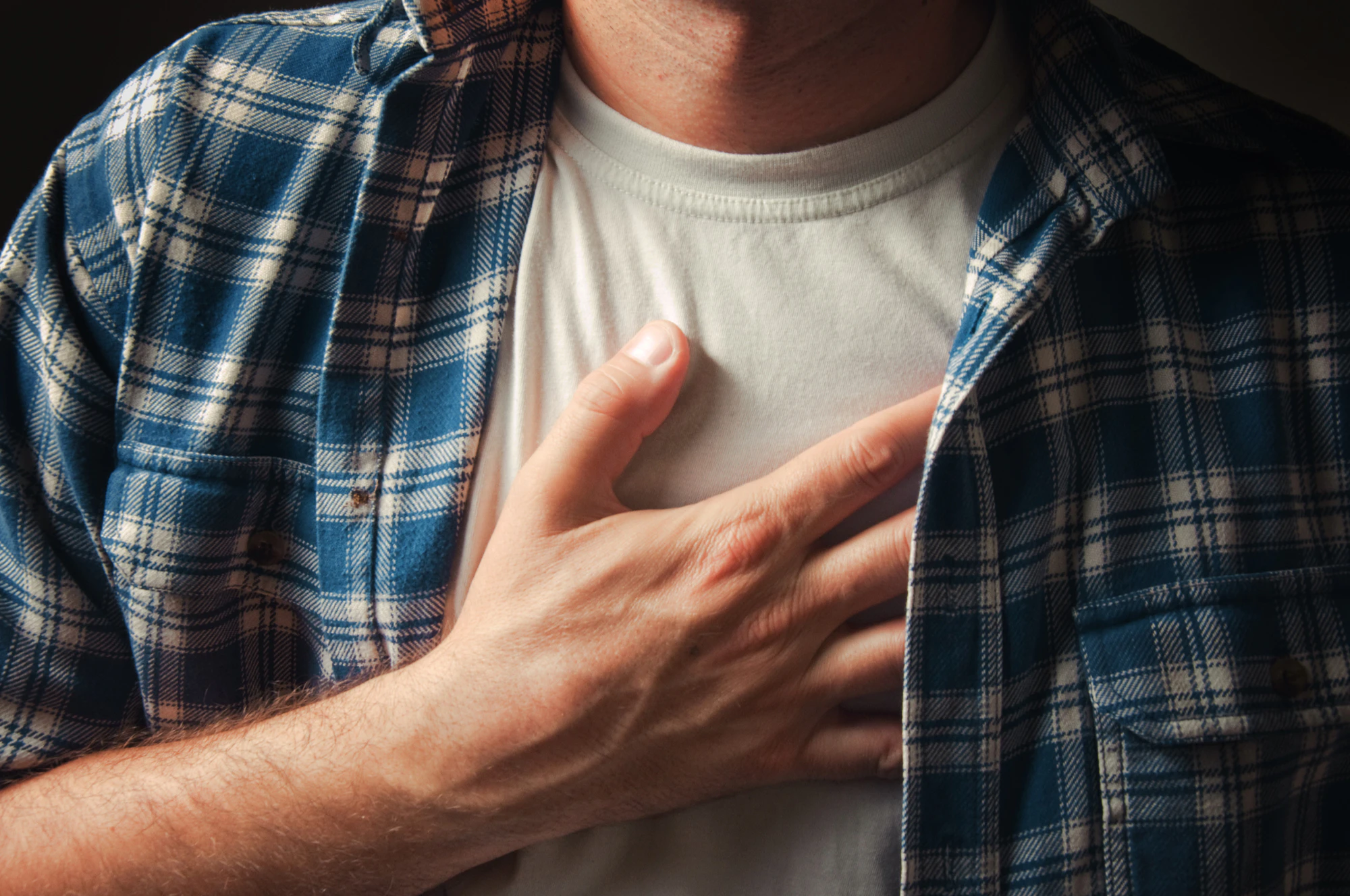How to Get Rid of Chest Pain
Chest Pain & Heart Attack
•
May 5, 2022
Reviewed by:

People often show up to the ER wondering how to get rid of chest pain, and if it is possible to do so at home. Chest pain is a very common reason for a visit to the ER, and understandably so. People often worry that they’re having a heart attack or a pulmonary event when they experience any moderate to severe chest pains.
While there are many non-emergency conditions that can cause chronic chest pain such as acid reflux or muscular inflammation that do not require emergency care, you should never hesitate to seek medical attention for sudden or recurring chest pains as they can be a symptom of a much more serious condition. If you are experiencing chest pain, here are some possible causes and some steps you can take to reduce your symptoms at home.
If the following steps do not provide immediate relief or you are experiencing emergency symptoms such as chest pain combined with shortness of breath, sudden confusion, and/or bluing of the lips or hands seek emergency medical care immediately.
Can chest pain go away on its own?
Depending on the underlying condition that is causing your chest pain, it is possible that it may go away on its own. The more serious the underlying causes of chest pain are, the more likely they will keep coming back.
Keep in mind that there is not always a correlation between pain level and the seriousness of the root causes. Minor pain can mean big problems, and acute, severe pain doesn’t necessarily mean that you are having a heart attack. Regardless, chest pain caused by an underlying condition will often be experienced until its root cause is treated.
Chest pains that come and go are often caused by:
- GI (gastrointestinal) issues like acid reflux, ulcers, or gallstones
- Inflammation in muscles
- Panic attacks
All chest pain should be taken seriously, even if it doesn’t send you running to the ER, and even if it goes away on its own.
What causes chest pains?
Chest pain can come from a number of sources, many of which can be classified under the umbrellas of their root causes. Some common causes of chest pain include:
- Musculoskeletal inflammation
- Muscle strains
- Costochondritis
- Lung conditions and heart conditions
- Asthma
- COPD
- Coronary artery disease
- Pericarditis
- Mitral valve prolapse
- Infections
- Pneumonia
- Congestion
- Stomach and chest pain from gastrointestinal complications:
- Acid reflux caused by GERD
- Peptic ulcer
- Gallstones
- Anxiety and other stress-related conditions
Heart disease is the leading cause of death in the United States, so chest pains are scary for good reason. Other than treating discomfort caused by chest pain, it is important to be aware of (and proactive about) your heart health. Neglecting to do so can lead to coronary artery disease (CAD), high blood pressure, and even heart attacks.
If you’re wondering what to do if someone is having a heart attack, have them chew and swallow an aspirin and call 911 immediately. Always err on the side of caution and get emergency help when in a medical crisis.
Continue reading: What are the signs of an unhealthy heart?
How to relieve chest tightness
There are a few ways to treat lingering chest pain once you have an idea of the root cause. Note that none of these suggestions will treat the root causes behind chest pain, they may only help to relieve discomfort. If they do not help to quickly relieve the symptoms, schedule an appointment to see your doctor or head to the nearest emergency room.
First aid for chest pain: gastrointestinal chest pain
- Avoid high acid food like tomatoes and citrus, fried food, or alcohol
- Try OTC heartburn and acid reducer medicine
- Avoid smoking or being in smoky areas
First aid for chest pain: inflammation
- Get as much rest as possible
- Apply a compression bandage around your chest
- Elevate your chest above your waist to decrease chest pain while lying down, sleep with extra pillows
- Apply an ice pack
First aid for chest pain: respiratory infection treatment
- Take decongestants as needed to break up the mucus and clear chest congestion
- Drink plenty of warm and room temperature fluids, these help with the clearing of congestion and staying hydrated during recovery
- Use a humidifier near your bed
Chest pain not going away? Get emergency help from a 24/7 Complete Care clinic
Knowing how to get rid of chest pain at home can only take you so far. The root cause of your chest pain will often require the help of a professional to diagnose and treat. If you or a loved one are experiencing chest pain or chest tightness that refuses to quit, you need help from a medical care provider.
Let Complete Care take complete care of you. We have ER locations all across Texas (in Austin, Corpus Christi, San Antonio, Dallas/Fort Worth, East Texas, and Lubbock) and Colorado Springs, equipped to treat you without the wait time of a traditional emergency room.
More Helpful Articles by Complete Care:
- What To Do After a Bike Fall
- Cycling Road Rash Care
- Is Paddleboarding Safe While Pregnant?
- 7 of the Most Common Wrist Injuries
- The Difference Between Acute vs. Chronic Pain
